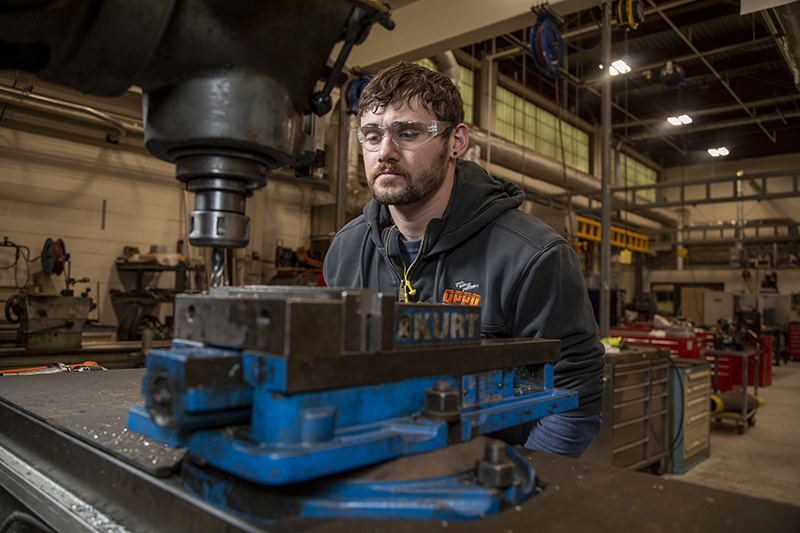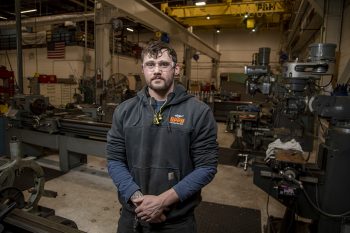For machinists, precision is key – along with a lot of math

Ryan Campbell knew early on he would learn a trade. Good in mathematics and big on hands-on work, he knew a skilled trade was his perfect fit.
Campbell’s father taught shop for more than 30 years and remains heavily involved in the SkillsUSA program, which advocates for skilled trades. So Campbell knew a skilled trade was his ticket to a high-paying job without the cost of a college degree. And he set his sights on a job with OPPD.
Campbell, now in his fourth year as a machinist apprentice at OPPD, is one of the utility’s 30 machinists and apprentices. The job demands a lot of time; machinists can be called on anytime and can end up working a lot of overtime. They are the front line for solving mechanical problems at OPPD’s generating stations, and they work on all pieces of machinery in the power plants.
As a student at Louisville High School, Campbell and his younger brother listened as their father, Roger Campbell, a Papillion La Vista South High School teacher, preached about the growing need for craftspeople in the workforce.
“He was the big driving force in my love of the trades,” said Campbell, a machinist apprentice at OPPD. “Same with my brother, we heard all about the benefits of the trades and took it to heart.”
The younger Campbell, Remington, also works at OPPD. He is an apprentice steamfitter mechanic. Both Campbells work at Nebraska City Station.
What machinists do
As the name suggests, machinists work on the machinery in power plants. And they say the machinery with rotating parts keeps them busiest.
“Anything with motors that turn – be it pumps, fans, mills or pressure grinders – gives us steady work each week,” said Kyle Brinckerhoff, Maintenance Services manager at NCS.
Brinkerhoff said the machinists keep busy year-round, but their skills are in great demand when there are planned or unplanned maintenance outages. Machinists average between 400 and 800 hours of overtime a year, said Bryan Hansen, supervisor of Maintenance Services.
And machinists don’t just work on the equipment. They also fabricate much of it, Hansen said. Machinists fabricate parts that aren’t readily available or that could take extra time to obtain. They also fabricate specialty devices used to disassemble equipment in the field or to lift certain equipment, Brinckerhoff said.
Doing so saves OPPD money and is a point of pride among machinists, he said.
A typical day for a machinist begins at 6 a.m. with pre-job meetings. Crew leaders go over the day’s work, typically in one of OPPD’s two baseload generating stations, though machinists also work in the peaking, or balancing, stations.
Both baseload plants, NCS and North Omaha Station, have assigned machinists, but those machinists can be called to work at either station. During outages, machinists from both plants commonly work together at the same site until the outage is over.
Machinists perform protective maintenance on equipment, which can range from changing or checking oil on equipment to taking a piece of equipment out of service to be rebuilt or replaced.
What it takes
Machinists typically attend two-year programs at trade schools. Campbell went to Metropolitan Community College’s South Omaha campus. OPPD hired Campbell immediately after he graduated.

The starting hourly wage for a machinist apprentice is about $32 and reaches nearly $54 once they become a journeyman.
Strong math skills and attention to detail are vital for machinists.
The math part is the first thing he tells students about when he visits area schools to promote the skilled trade. Many students don’t want to hear that, he said, but they need to if they are considering the career.
Campbell is passionate about the craft and is one of OPPD’s best ambassadors in promoting the trade, Hansen said. Campbell has spoken to his father’s students several times. He has done the same in many of the area’s high schools.
“I don’t remember how many exactly, but I’ve been to a lot of them,” Campbell said. “I’ve advocated for the trades even before OPPD hired me. I want to get as many kids as possible involved in the trades. They don’t know about all the opportunities available to them if somebody doesn’t tell them.”
A desire to learn
Besides the need for math, one of his most significant messages is this: “The biggest requirement is to get up in the morning with a desire to learn. All these trades are looking for someone who will get up and be there each day and be ready to learn.”
Because machinists, like other skilled trade employees, are always learning.
On a recent day, Campbell spent the morning outside at NCS working on the gearbox for unit 2’s cooling stack. He was measuring the relief valve while determining how to replace the valve without shutting the unit down.
“We have to take a lot of measurements,” he said. “That’s one of the areas where the math comes in. A lot of our measurements must be so precise, measurements that are less than one-sixteenth of an inch. I tell the high school kids a lot of the measurements we deal with are one-third the width of a human hair.”
Machinists’ work can be physical; the job was once thought of as one for big, strapping men. But if you can turn a wrench, you can do the job, Campbell said.
“What we need on this job are big, strapping math minds,” he said.

Jason Kuiper joined OPPD as a communications specialist in 2015. He is a former staff writer and reporter at the Omaha World-Herald, where he covered a wide range of topics but spent the majority of his career covering crime. He is a graduate of the University of Nebraska at Omaha and has also appeared in several true crime documentary shows. In his free time he enjoys cooking, spending time with his wife and three children, and reading crime novels.
View all posts by Jason Kuiper >







